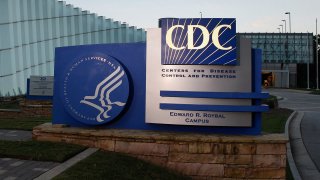
- There have been more than 1,200 reported cases of a myocarditis or pericarditis mostly in people 30 and under who received Pfizer's or Moderna's Covid-19 vaccine, according to CDC data.
- Roughly 300 million of the shots had been administered as of June 11, the agency said.
- For both vaccines combined, there were 12.6 heart inflammation cases per million doses.
A CDC safety group said there's a "likely association" between a rare heart inflammatory condition in adolescents and young adults mostly after they've received their second Covid-19 vaccine shot, citing the most recent data available.
There have been more than 1,200 reported cases of a myocarditis or pericarditis mostly in people 30 and under who received Pfizer's or Moderna's Covid vaccine, according to a series of slide presentations published Wednesday for a meeting of the Centers for Disease Control and Prevention's Advisory Committee on Immunization Practices.
Get top local stories in San Diego delivered to you every morning. >Sign up for NBC San Diego's News Headlines newsletter.
Myocarditis is the inflammation of the heart muscle, while pericarditis is the inflammation of the membrane surrounding the heart.
"Clinical presentation of myocarditis cases following vaccination has been distinct, occurring most often within one week after dose two, with chest pain as the most common presentation," said Dr. Grace Lee, who chairs the committee's safety group. CDC officials are gathering more data to fully understand the potential risks, how to manage it and whether there are any long-term issues, she said.

The agency said there have been 267 cases of myocarditis or pericarditis reported after receiving one dose of the mRNA vaccines and 827 reported cases after two doses through June 11. There are 132 additional cases where the number of doses received is unknown, the CDC said.
Money Report
Roughly 300 million of the shots had been administered as of June 11, the agency said.
"This is still a rare event," Dr. Tom Shimabukuro said at the meeting. For both vaccines combined, there were 12.6 heart inflammation cases per million doses. The cases were more frequent among Moderna's vaccine recipients at 19.8 cases per million versus eight cases per million for Pfizer's, he said.
Men under 30 make up the bulk of the cases, the CDC said, and most cases appear to be mild. Of the 295 people who have developed the condition and have been discharged, 79% of them have fully recovered, according to the presentation. Nine people were hospitalized, with two in intensive care as of June 11, according to the agency.
CDC officials said the benefits of getting the Covid vaccine still outweigh the risks.
Cases among younger people are on the rise as older people get vaccinated at higher rates. The U.S. has vaccinated 177.6 million people with at least one dose, roughly 53% of the population, according to the CDC. Just 13.6% of 18- to-24-year-olds have had at least one vaccine dose in the U.S., compared with 26% of people ages 50 to 64, the data shows.
While older age groups have seen hospitalization rates fall, they've barely budged among adolescents and young adults, said the CDC's Dr. Megan Wallace.
"Adolescents and young adults make up a greater proportion of total cases; 33% of cases reported in May were in persons aged 12 to 29 years, compared with 28% last December," she said. Since the beginning of the pandemic, 2,767 people ages 12 to 29 years old have died from Covid, she said, noting that 316 of those fatalities have happened since April 1.
After Wednesday's meeting, the Department of Health and Human Services released a statement co-signed by the CDC and several medical professional groups that stressed the heart condition is extremely rare.
"Only an exceedingly small number of people will experience it after vaccination," HHS said. "Importantly, for the young people who do, most cases are mild, and individuals recover often on their own or with minimal treatment. In addition, we know that myocarditis and pericarditis are much more common if you get COVID-19, and the risks to the heart from COVID-19 infection can be more severe."
The CDC is coordinating its investigation with the Food and Drug Administration, which last month authorized the Pfizer-BioNTech vaccine for adolescents ages 12 to 15. Symptoms, which include chest pain and shortness of breath, typically develop within a week of receiving the shot with most developing within four days, the agency said.
-- CNBC's Rich Mendez contributed to this article.
Correction: The majority of cases of people who experienced myocarditis occurred in people 30 years old and under. An earlier version misstated the age. The number of cases per million doses administered was 12.6. An earlier version misstated the figure.






